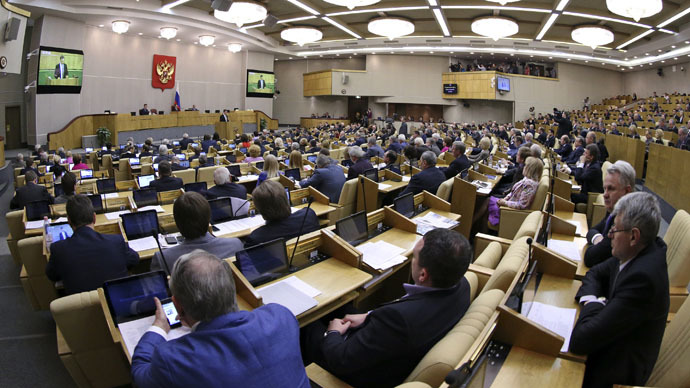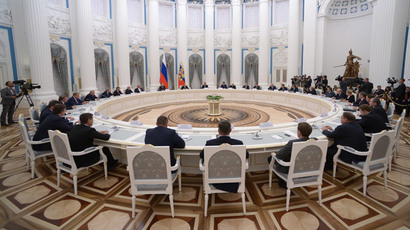'Aggressor nation' bill put to parliament

State Duma deputies have drafted a motion defining all countries that introduce sanctions against Russia as “aggressor nations” and ordering automatic reciprocal sanctions against them.
The bill went to the lower house with a negative review from the government – its experts ruled that the draft contradicted a number of existing Russian laws, not to mention the Constitution. The definition of aggression used in the document was also different from the internationally accepted formula used in the UN General Assembly’s resolutions.
The motion on aggressor nations was prepared and drafted by two MPs from conservative parliamentary majority party United Russia and one from the nationalist-populist party LDPR.
The current draft published on the Duma’s official website gives the Russian government the powers to form and approve a list of ‘aggressor nations’ – countries where authorities introduce sanctions against Russia, its citizens or companies.
Once some country is included in this list, all its citizens, permanent residents and companies registered on its territory automatically lose the right to deliver legal services, business consultancy and financial audits on Russian territory. The government also will be able to lift some of the sanctions or introduce additional restrictions on business activities on such people and companies if such necessity arises.
The sponsors of the bill claim that it would contribute to Russia’s economic sovereignty and guarantee the stable development of the national economy. MP Evgeny Fyodorov (United Russia) is known for similar suggestions made earlier this year. In June, he claimed that the lower house was preparing a bill that would completely ban state-owned companies from using the services of US consulting firms and their subsidiaries. Prior to that, he suggested outlawing the use of US accountancy firms to financially audit state corporations.
Apart from the government the new motion met with resistance in the State Duma itself. Deputy head of the Committee for Constitutional Legislation, MP Vyacheslav Lysakov (United Russia) told TASS that the formulas used in the current draft were extremely vague and politicized.
“Today we have one aggressor nation and tomorrow another and the next day the aggressor nation becomes the best friend and so on – all these things are very relative,” the politician noted.
However, Lysakov agreed that the countries with unfriendly policies towards Russia needed some definition in Russian legal field.
This summer the European Union, the United States and several of its allies have imposed economic sanctions on senior Russian officials and some larger companies over Russia’s alleged role in the current crisis in the east and southeast of Ukraine.
In early August Russia replied with a ban on imports of meat, fish, cheese, milk, vegetables and fruit from Australia, Canada, the EU, US and Norway. Top Russian officials, including President Putin and Prime Minister Medvedev said in public addresses that Russia did not fear the sanctions and that attempts at exerting pressure on the country would have no effect.














